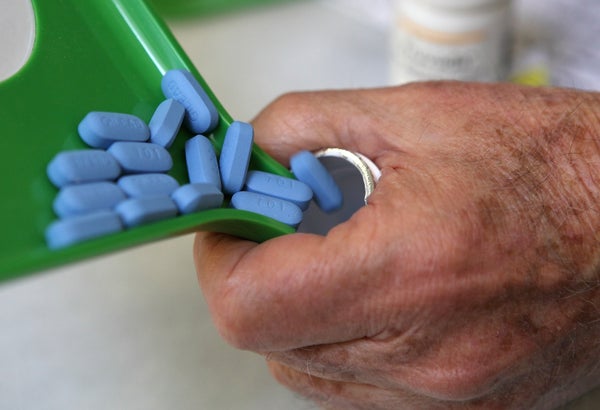The Trump administration on Tuesday detailed how it will roll out the delivery of donated HIV prevention drugs to people who should be taking them but do not have prescription drug coverage.
Pre-exposure prophylaxis or PrEP drugs, which are taken daily, have been shown to be highly effective at preventing infection, but they are expensive and too few people at risk use them. The goal of the new program, called “Ready, Set, PrEP” and unveiled by Alex Azar, secretary of health and human services, is to expand both access and use.
The medication is being made available by the drug maker Gilead, which announced in May that it would donate to the government enough supplies to protect up to 200,000 people a year over the next 11 years. The cost of medical appointments and lab tests needed to qualify are not covered.
On supporting science journalism
If you're enjoying this article, consider supporting our award-winning journalism by subscribing. By purchasing a subscription you are helping to ensure the future of impactful stories about the discoveries and ideas shaping our world today.
The program is part of a larger federal initiative to reduce the number of new HIV infections each year in the country by 90% by the year 2030. In recent years roughly 38,000 people are infected annually with the virus.
“Ready, Set, PrEP is a historic expansion of access to HIV prevention medication and a major step forward in President Trump’s plan to end the HIV epidemic in America,” Azar said in a statement. “Thanks to Ready, Set, PrEP, thousands of Americans who are at risk for HIV will now be able to protect themselves and their communities.”
To reach the goal of stopping HIV transmission, health authorities estimate that 95% of infected people must be diagnosed, 95% of the diagnosed must be virally suppress by HIV drugs, and 50% of at risk people must be using PrEP. Data released Tuesday by the Centers for Disease Control and Prevention show the country is currently off the mark on all three counts, the latter two by large margins.
In the U.S. about 1.2 million people are at risk of being infected with HIV, but only about 18% of them has PrEP prescriptions last year, Azar said. The Trump administration estimates that roughly 200,000 people could benefit from free access to PrEP.
Underuse of the drugs is often attributed to their high cost—about $20,000 a year. But stigma, lack of awareness, and other factors contribute to the underuse. Even if everyone eligible for this new program took advantage of it, nearly 800,000 people who would benefit from using PrEP would still not be using the medication.
Gilead has been long under fire for the high cost of PrEP. And this program will do nothing to lower those cost across the board, said Jennifer Kates, director for global health and HIV policy for the Kaiser Family Foundation.
“Increasing awareness of and access to PrEP is critical and this is a very important step forward—both the provision of PrEP for free and the expansion of access points,” she said in an email. “Of course this effort does not address the underlying price of PrEP or include the costs of clinic visits and lab tests. The price issue in particular is one that will continue to loom over the initiative as it moves ahead.”
Gilead is also being sued by HHS for patent infringement over Truvada, the brand name for one of the two drugs used for PrEP. The department argues that the drug infringes federal patents, an assertion the company denies. Gilead counters that the patents are invalid and it has petitioned the U.S. Patent and Trademark Office to cancel them.
Under the agreement with HHS, the company donates the medication but the government must cover costs of the program, which include determining if someone who applies is eligible as well as distribution and processing claims.
Currently that will run the government about $200 a bottle for a 30- or 60-day prescription, Azar said, because initially the government will use Gilead’s distribution network. The government is developing a distribution system involving the pharmacy chains CVS (CVS) Health, Walgreens (WBA), and Rite Aid, which will forgo charging dispensing fees for these prescriptions, bringing the cost down further, Azar said. That system will be in effect before the end of March, he said.
Studies have shown that PrEP reduces the risk of contracting HIV from sex by about 99% when taken daily. Among injection drug users, PrEP reduces the risk of HIV infection by at least 74%, when taken daily.
To be eligible for the new program, people must test negative for HIV, have a valid prescription for the medications, and not have prescription drug coverage.
Republished with permission from STAT. This article originally appeared on December 3 2019
